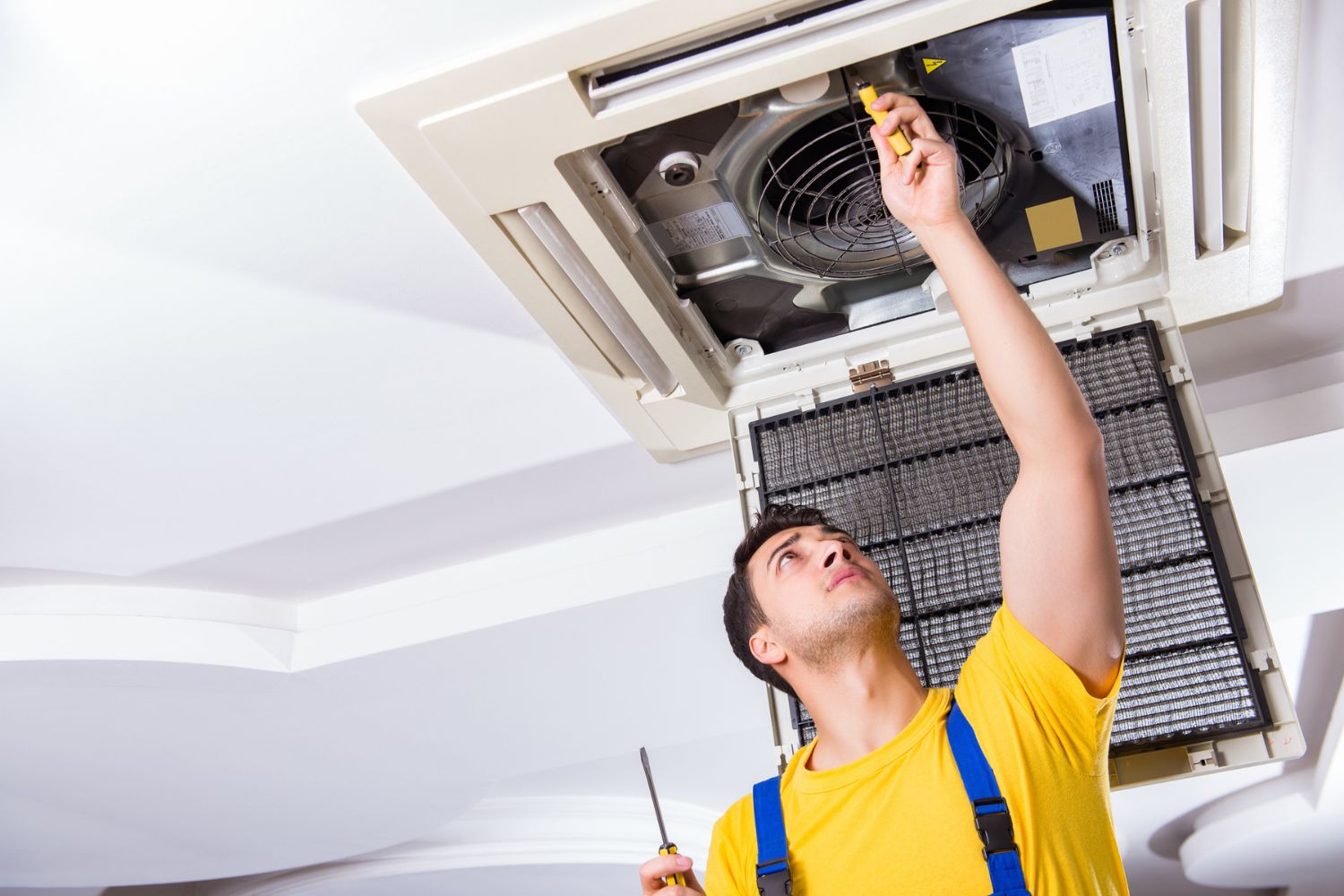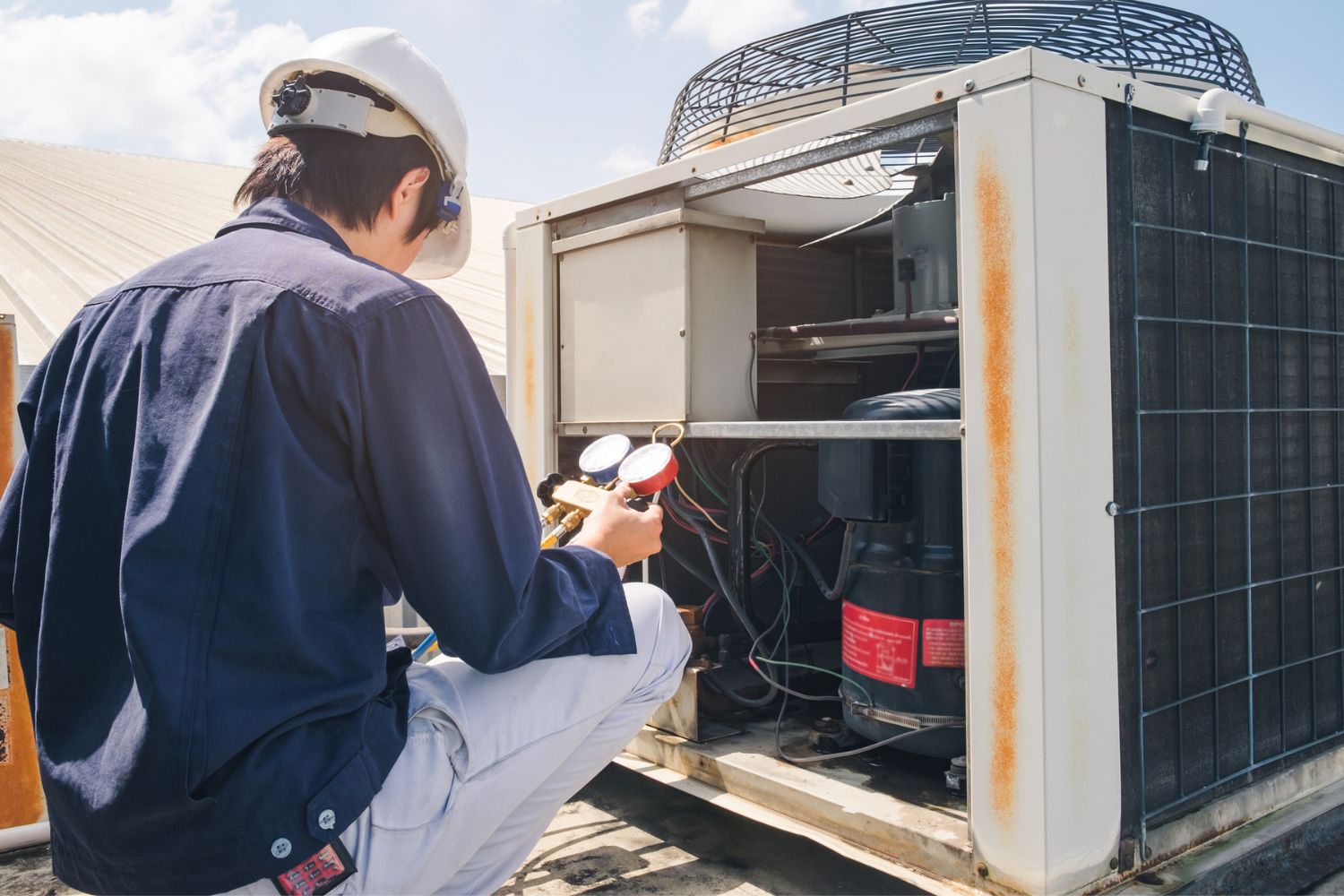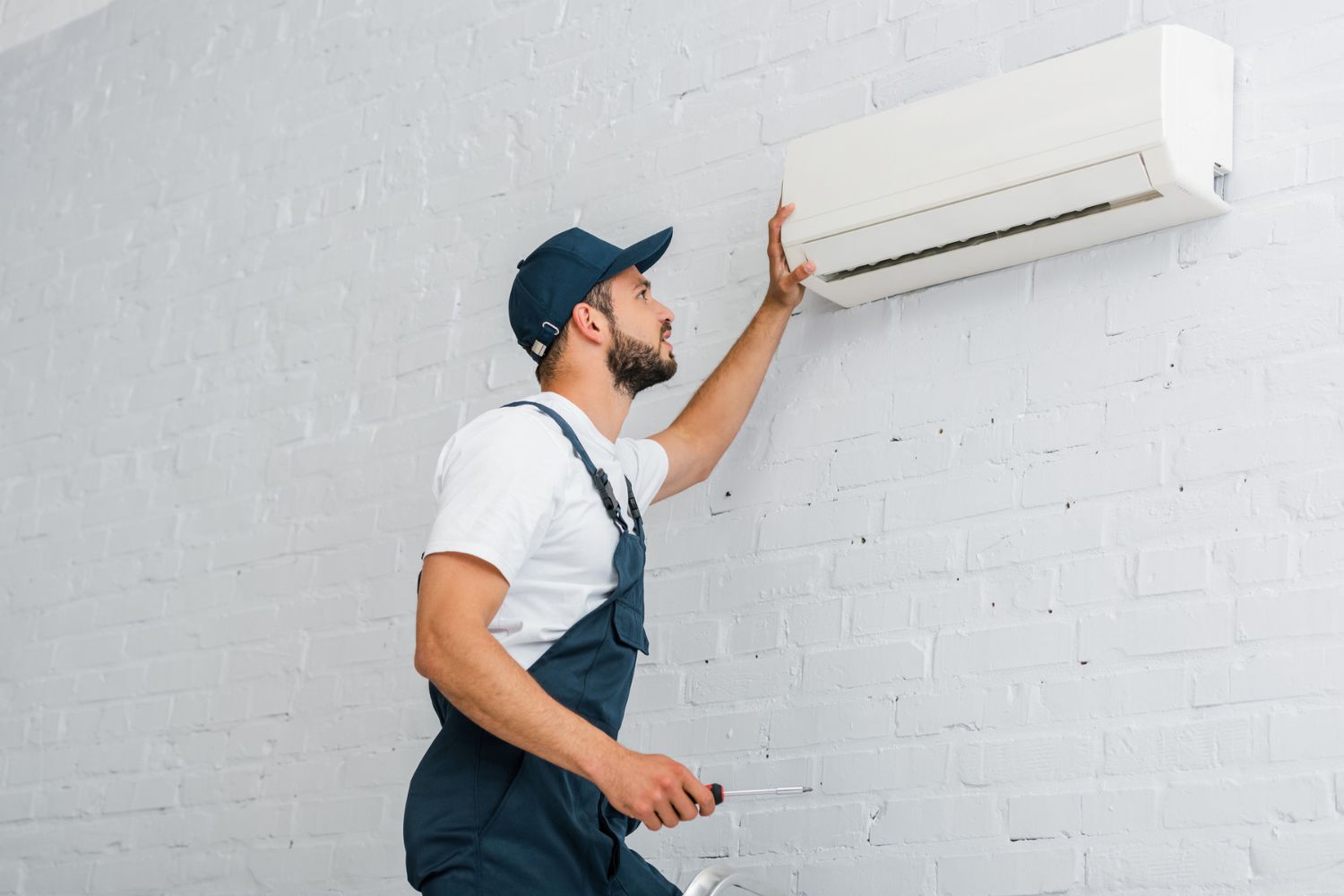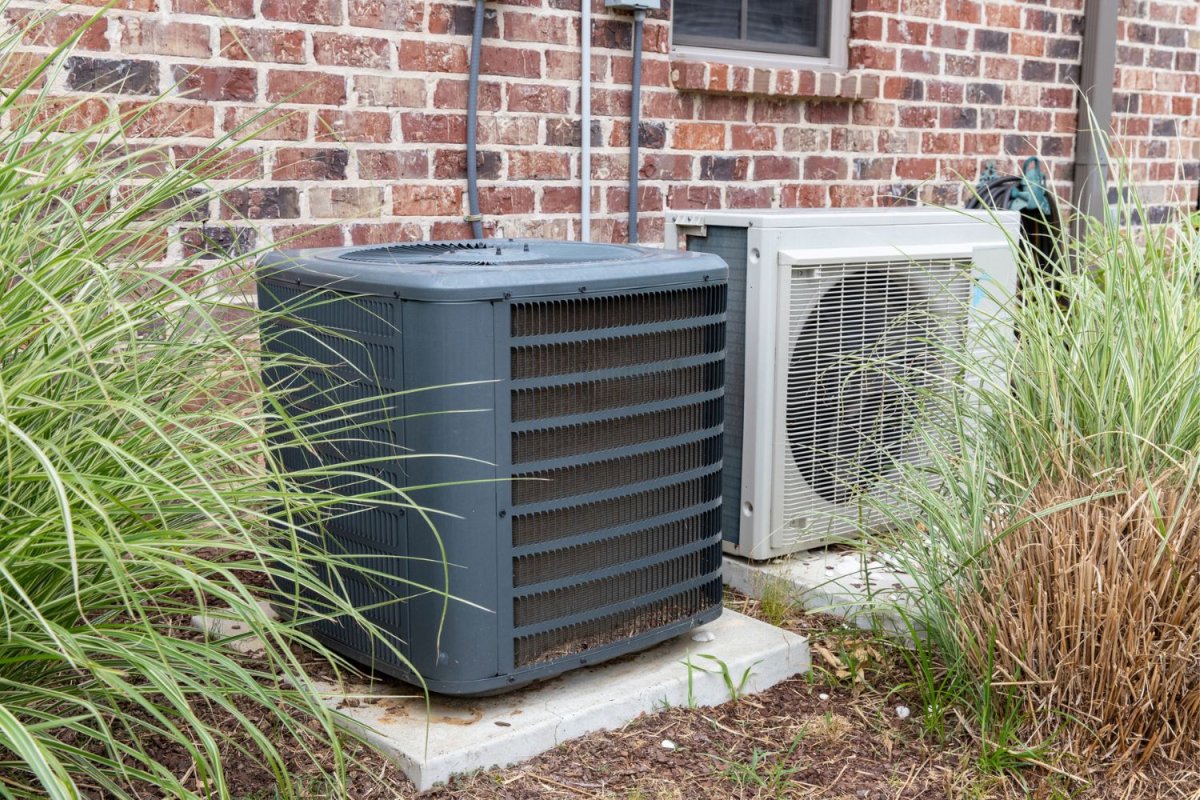We may earn revenue from the products available on this page and participate in affiliate programs. Learn More ›
- Typical Range:$75 to $200
- National Average: $100
A home’s heating, ventilation, and air conditioning (HVAC) system is the most important appliance for keeping the house comfortable year-round. Still, it tends to be neglected since the system doesn’t sit right out in the open. Today’s smart thermostats allow homeowners to program the temperature for weeks in advance, so it’s no wonder HVAC systems get ignored—they’re basically out of sight and out of mind.
However, all HVAC systems will benefit from professional servicing at least once per year. Think of an HVAC servicecall as an annual checkup for the system. An experienced technician will inspect all the components to see if any need replacing, check that everything is functioning the way it should be, and then clean the unit and lubricate moving parts.
Considering that it costs from $5,000 to $10,000 to install a new HVAC system, it makes sense to invest between $75 and $200 per year to ensure the existing appliance is running smoothly. HVAC service cost varies based on several factors, but the odds are that you’ll pay around $100 for an annual service call by a licensed HVAC technician.
Factors in Calculating HVAC Service Cost
When it comes to home heating and air conditioning systems, an ounce of prevention really does save money. Having the HVAC system inspected and serviced on an annual basis allows a technician to pinpoint problems while they’re minor—when repairs are minimal rather than cost prohibitive. While the typical range for HVAC servicing runs from $75 to $200, the ultimate price you’ll pay also depends on whether the technician finds problems, if repairs are necessary, and the going rate of labor in your community.
Unit Size, Type, and Age
For the most part, no matter what type of unit you have, its size, or its age, the estimated HVAC annual service cost will still run an average of $100. Of course, older units have seen more use, so they’re slightly more prone to having parts wear out. Still, a regularly serviced, older HVAC unit usually requires minimal servicing, so unless there’s a mechanical problem, you can still expect to pay somewhere in the range of $75 to $200.
Brand
Like size and age, the HVAC brand won’t unduly affect the $75 to $200 price range for servicing unless the unit is still under warranty. If this is the case, the manufacturer may require servicing by a technician who is certified explicitly for the brand, and the manufacturer will often pay some or all of the servicing costs.
Service Type
During an annual HVAC service call, a qualified technician will check all the parts of the system and perform routine maintenance, which will include:
- Inspecting the ducts
- Checking the refrigerant level (if more is needed, recharging could add up to $300)
- Vacuuming dust from inside the unit
- Lubricating moving parts
- Checking to ensure the drain line is clear of blockages
- Testing the thermostat
Materials and Labor
For a typical service call where the technician cleans and services the system, the HVAC company may charge a standard fee covering all of the above types of service. This fee may be around $125. Alternatively, the company may charge hourly, typically from $50 to $150 per hour, depending on the going rate for labor in the community. These fees do not include the costs of material or labor to repair damage to the unit or replace vital components.
Geographic Location
Where you live probably won’t be a factor in how much you pay for an HVAC service call unless your home is out of the company’s general service area, in which case you may be charged an additional travel fee. Barring that, you’ll still likely pay $75 to $200 to have the HVAC system checked and maintained.

Additional Costs and Considerations
Heating and air systems are appliances, and unfortunately, appliances sometimes need more than just an annual checkup. If the technician has to make repairs or replace parts, it will add to the cost. The following factors can impact the final price.
Repair vs. Replacement
If your HVAC system isn’t working correctly, you may have to pay substantially more to repair or replace components. Fortunately, keeping the system maintained and serviced typically extends its useful life and reduces the risk of needing expensive repairs. The technician can offer advice on whether a part can be fixed or whether it should be replaced.
- An AC compressor costs around $1,350 to repair and $2,300 to replace.
- Repairing the fan motor costs around $100, and replacing it costs around $700.
- Air conditioning services to repair damaged ducts run about $500. Replacing the ducts averages closer to $2,000.
- Simple thermostat repair runs around $50, while replacing the thermostat with one of today’s smart models could set you back about $500.
Over time, homeowners can expect to run into some of these costs because HVAC parts wear out. Often, catching a problem early means it will cost less to repair it.
Maintenance Agreement
Some HVAC companies offer standard HVAC maintenance cost guarantees that state if anything goes wrong with the system within a certain amount of time, say 3 to 6 months, the company will service the unit again without charge. Some companies offer extended warranties the homeowner can purchase for various lengths of time. The best course of action is to read the wording carefully and see if you think an additional charge is worth the service being offered.
Warranty Coverage
If the HVAC system is still under warranty, the manufacturer may pay for most or all of the annual service charge. This way, the manufacturer helps ensure your system is running well, so the manufacturer is taking less risk of the unit malfunctioning. If a technician spots problems while the unit is under warranty, the manufacturer will often cover parts and labor costs to make the repairs. Homeowners may also want to consider purchasing a policy from one of the best home warranties for HVAC coverage. Some of the best companies, such as American Home Shield, offer free or discounted HVAC tune-ups to help keep the home’s system running smoothly.
Season
HVAC companies are busiest in early spring, summer, and fall when most homeowners schedule service calls. Expect to pay full price ranging from $75 to $200 for service and maintenance during these times. However, if you wait until midwinter, you may get as much as a 30 percent discount off the regular costs, as this is typically a slow time for many companies.
HVAC Service Types
If you call for an annual inspection, odds are you’ll pay around the national average of $100 unless problems are found that require more costly repairs.
Routine Maintenance
Routine maintenance service is what most HVAC companies offer, and it includes the inspections and upkeep listed above. This is typically a quick visit, and the technician can check all the main components in about an hour or so. If nothing is wrong with the system, this should cost between $75 to $200.
Emergency Service
During the heat of summer or the frigid temps of winter, if an HVAC unit stops working or has noticeable issues, such as low airflow or not heating or cooling adequately, the problem may be an emergency. If the company has to send out a technician after working hours or on the weekend to inspect the unit, expect to pay an additional $200 to $300 emergency fee on top of the standard charges. Typically, HVAC emergency service costwill be substantially more expensive than routine service costs.
Unit Repair or Replacement
Being able to repair a damaged HVAC unit is considerably less expensive than replacing it, but it can still be costly. This is where the brand name may come into play because some brands are more costly to repair (and replace) than others. For example:
- It can cost between $250 and $600 to repair a Bryant AC unit but run $6,000 to $9,000 to replace it.
- Repairs on a Lennox average $400 to $1,000, while replacing a Lennox AC runs between $4,650 and $10,275.
- An Armstrong AC costs an average of $620 to $1,500 to repair but could run $5,300 to $10,300 to replace.

Do I Need HVAC Service?
Even if your HVAC unit is running adequately, it’s good to have it serviced once per year to help minimize problems down the line. The cost of HVAC serviceranges from $75 to $200, and that’s an investment in peace of mind. However, if the system exhibits any of the following symptoms, it’s best to schedule a service call as soon as possible.
Excessive Cycling
Excessive cycling happens when the AC or furnace is not producing enough cool or warm air. The unit will shut off and then turn back on within a few minutes when this happens. This indicates the system is working harder than it should be, and a technician should take a look. Repairing the problem could be more expensive than what a standard HVAC service call costs, depending on the diagnosis.
Excessive Noise
Air conditioners and furnaces make some noise when running efficiently, but that noise is often a steady hum. If clanking or banging is heard, it could be a problem in the motor, fan, or another area, requiring prompt attention.
Diminished Airflow
When either the furnace or the AC stops blowing out air forcefully, something is amiss. It could be something as simple as a leak in a duct or something more significant. Either way, it’s time to call a technician.
Unusual Smell
You shouldn’t smell anything odd when the AC or the furnace comes on. If you smell burning, that’s a sign something could be wrong with the motor, and you should shut off the system, call the fire department, and call a service technician. Smells that are less of an emergency, but still problematic, include chemical odors and musty smells that could indicate mold growth in the system.
Inaccurate Thermostat
Some thermostats are easily adjusted, and during a regular service call, most technicians check the temperature accuracy of the thermostat and adjust it if necessary. This minor maintenance step is usually included in the $75 to $200 cost range for HVAC service calls. If a new thermostat is needed, installing one could add up to $500 to the cost, depending on the type of thermostat chosen.
Excessive Humidity
When an air conditioner is running efficiently, it cools the air and removes humidity. Lower humidity levels make the indoor air more comfortable. If the humidity level in the house seems high, the air conditioner may not be functioning at an optimal level.
Condensation or Frost
Condensation, frost, or standing water can result from several HVAC problems, including a blocked condensate tube, too little refrigerant in the evaporator coils, or other things. The only way to know is to have a professional HVAC technician out to take a look.
Routine Maintenance
Having an HVAC system inspected and maintained once per year makes good sense. Problems with the system can often be discovered and repaired before they become major issues. It’s typically well worth the $75 to $200 it costs to have a certified technician come out and service the unit.
HVAC Service Cost: DIY vs. Hiring a Professional
A homeowner can easily complete some routine maintenance tasks, such as changing air filters. In fact, HVAC manufacturers often recommend changing filters every 30 to 90 days, so the homeowner should be changing them. However, other routine HVAC services require special tools or knowledge beyond the scope of DIYers. Plus, only a certified technician can legally recharge the refrigerant in an AC system.
How to Save Money on HVAC Service Cost
In most cases, the HVAC company will charge a standard fee for a regular yearly service call and maintenance, and you’ll know in advance how much it will cost. However, consider the following to keep from getting hit by surprise costs.
- Check to see if your system is under warranty before calling a technician. If it is, the manufacturer may arrange for the service call and may pay for most or all of it.
- Schedule annual maintenance during the winter. This is the off-season for most HVAC companies, and you could receive a discount of up to 30 percent.
- Change your own air filters according to the manufacturer’s recommended schedule. This will keep dust and dirt out of the system, which will extend the unit’s useful life, and it may cut down on repair costs.

Questions to Ask About HVAC Service Cost
Many homeowners feel that paying an average of around $100 annually isn’t excessive for keeping an HVAC system running smoothly. Still, it won’t guarantee that the system will never need repairs. If you’re calling a technician out more than once a year to fix the HVAC system, you may want to ask the following questions.
- Should I repair or replace the unit? Most HVAC units last 12 to 15 years. If repairs are starting to get expensive, the technician may recommend buying a new unit.
- Do you take payments? Payment for basic service fees is often due on receipt, but if your system needs major repairs or you need to install a new system, the company may offer financing options.
- Do you provide a service agreement? Some companies automatically guarantee their work for a few months, while others sell service agreements that include the technician coming back within a specified time if additional repairs are necessary.
FAQs
An HVAC system is often the most significant appliance in a home, and, like all appliances, it will benefit from regular servicing and maintenance. If you’re wondering how often to schedule HVAC service or your system is currently experiencing problems, you’ll likely have a few questions.
Q. Why do you need HVAC maintenance?
The most common reason is to ensure that the system runs efficiently and keeps the home at a comfortable temperature.
Q. How often should you have your HVAC serviced?
Optimally, an HVAC system should be inspected and serviced at least once per year.
Q. What happens if you don’t service your HVAC?
Dirt and dust can build up in the system and reduce its efficiency. In addition, if minor problems are not spotted and repaired promptly, they could develop into more significant issues that are costly to fix.
Q. What is the difference between AC and HVAC?
A central air conditioner (AC) is one component in a more comprehensive heating, ventilation, and air conditioning (HVAC) system. The entire system usually includes a furnace as well as an AC unit. AC maintenance costis included in basic HVAC annual service costs of around $100.
Q. What does HVAC service include?
Typically, a certified technician will inspect all the system parts and test it to make sure it’s producing enough heated and cooled air, clean the components, and then make repair suggestions if necessary.
Q. How long does HVAC service take?
Unless the technician runs into problems or it isn’t easy to access the system, it usually takes 1.5 hours or less.
Q. What does HVAC service cost on average?
Many wonder, how much does HVAC service cost? It usually ranges from $75 to $200, and most homeowners nationally pay around $100 for the service. On the other hand, emergency AC repairservices could run $200 to $300 higher.
Source: Angi, HomeAdvisor, U.S. News, PickHVAC, Fixr


